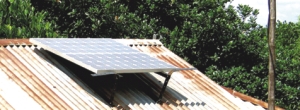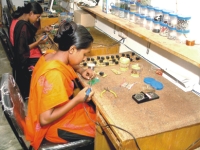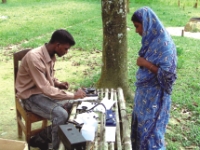|
Special Feature
On the threshold of change
Ishraq Zahra Khan
 Development has speeded up the pace of our lives in the city. As we juggle our various jobs, pick up last minute groceries on the way home, help our children finish homework before going back to preparing for the next day's work, we cannot imagine a life outside this frame. We cannot imagine what it might be like if we were living in a remote village far from Dhaka where the race would have to be to finish all our work before dusk when everything comes to a standstill; when it is no longer productive or safe because there is no power, no light except that of dim, inadequate little kerosene-burning kupis and lamps. This is a country where only 38 percent of the population have access to electricity (according to a study conducted by the Government) - a place where the Rural electrification board covers only 40 percent of our villages among which only 40 percent can even afford their services. According to the World Bank, we incur economic losses up to one billion dollars a year due to unreliable power supply. This life we cannot imagine is in full swing somewhere right in our midst and such a time may not be too far in our future when we would be faced with a serious energy crisis. Development has speeded up the pace of our lives in the city. As we juggle our various jobs, pick up last minute groceries on the way home, help our children finish homework before going back to preparing for the next day's work, we cannot imagine a life outside this frame. We cannot imagine what it might be like if we were living in a remote village far from Dhaka where the race would have to be to finish all our work before dusk when everything comes to a standstill; when it is no longer productive or safe because there is no power, no light except that of dim, inadequate little kerosene-burning kupis and lamps. This is a country where only 38 percent of the population have access to electricity (according to a study conducted by the Government) - a place where the Rural electrification board covers only 40 percent of our villages among which only 40 percent can even afford their services. According to the World Bank, we incur economic losses up to one billion dollars a year due to unreliable power supply. This life we cannot imagine is in full swing somewhere right in our midst and such a time may not be too far in our future when we would be faced with a serious energy crisis.
What started out as a hobby for Golam Kabir Irfan, the CEO and initiator of Sun NRG, soon transformed into a passion, a pursuit toward developing alternative renewable energy that could be availed and afforded by the whole country, especially the rural poor. Working out of his home, this small initiative started off fuelled by his own effort and enthusiasm backed by the support of his ragtag but highly motivated little team of dedicated technicians. And now, just four and a half years later, they are on the verge of a breakthrough in supplying fully developed solar equipment that could turn around the lives of thousands of people in rural Bangladesh.
 Through advanced design research and development, Irfan and his team have come up with a number of robust products that are durable and almost flawless. The smallest of these lamps can last for up to seven hours or so before recharging from a small-sized solar panel that could be set up anywhere the sun shines and have been designed to give enough light for two children to study after dark in a rural homestead. Sun NRG has developed a wide variety of lighting products, starting from these small solar powered lamps to big community-based systems that can be installed to be used by a number of families or an entire neighbourhood. Sun NRG has a whole range of products for particular target groups. Through advanced design research and development, Irfan and his team have come up with a number of robust products that are durable and almost flawless. The smallest of these lamps can last for up to seven hours or so before recharging from a small-sized solar panel that could be set up anywhere the sun shines and have been designed to give enough light for two children to study after dark in a rural homestead. Sun NRG has developed a wide variety of lighting products, starting from these small solar powered lamps to big community-based systems that can be installed to be used by a number of families or an entire neighbourhood. Sun NRG has a whole range of products for particular target groups.
The mini solar home system is aimed at the ultra poor who don't have any access to electricity and cannot afford elaborate alternative systems. Gadgets under this category include flashlights, lanterns, bicycle lights that are highly energy efficient and can last up to seven hours per charge.
The independent solar home system is addressed to those in the villages who are slightly better off and so are a little more expensive.
The community-based solar power system can be installed in one rural household but used by an entire cluster of families. An additional feature of this type of system is that it generates income for the host family.
 The Hybrid system is the most efficient alternative power source that can be charged using both solar as well as electrical energy. Unlike IPS's though, when it's charged on solar power it does not use up any electricity and so it is free. These are addressed to people both rural and urban who have electrical power grids in their areas but are often deprived of it due to load-shedding. The Sun NRG office runs entirely on this type of system and everything from computers to fans and lights and other equipment continue to work even when the electricity is out. The Hybrid system is the most efficient alternative power source that can be charged using both solar as well as electrical energy. Unlike IPS's though, when it's charged on solar power it does not use up any electricity and so it is free. These are addressed to people both rural and urban who have electrical power grids in their areas but are often deprived of it due to load-shedding. The Sun NRG office runs entirely on this type of system and everything from computers to fans and lights and other equipment continue to work even when the electricity is out.
IRFAN strongly believes that everybody in Bangladesh is entitled to light in their households to be able to perform their basic chores. This is why one of the first products they developed was the portable solar lantern, hoping that these will replace the traditional kerosene hurricane used in villages which emit harmful carbon dioxide into the atmosphere and are also very expensive to maintain in the long run. They have also developed a model for bicycle and rickshaw lights.
What makes Sun NRG's initiative even more groundbreaking is the fact that their range of products are the first among solar energy products to successfully use LED (light emitting diodes) technology to charge the lamps, conserving even more energy as a result.
Their products have been tested and endorsed by experts from the Dhaka University and authorities on solar technology the world over have been attracted by the gravity of the work. Dr. Sajed Kamal, an international expert on renewable solar energy recently visited the Sun NRG workshop and was amazed at how much such a small team had accomplished in only a few years. Through trial and error, and a constant eagerness to serve those who need their help the most, the team has perfected products, and are ready to launch them in the rural areas. They have recently started working on distributing their mini solar home systems to the remotest corners of the country through the help of different NGOs who already have networks that could be used.
Working with Proshika, a local NGO, Sun NRG is now trying to reach the lower income rural population with their community based systems. One of these pilot projects in Gazipur has been installed on the roof of the house of a local trader, Mannan Bhuiya. Twenty houses in his neighbourhood have two lights each which are charged every week from the primary unit installed on his rooftop for a small charge. Although the system is a work in progress the users appear to be happy with it, the power and additional income that it brings in. Bhuiya's wife, when asked about it excitedly replied that the lights have been a big help to their household, specially the one installed in the kitchen which allows her to cook at night.
One of the families who charge their battery every week from the Bhuiyas' panel, live on the outskirts of the village. They have three children, a seven-year-old daughter and two sons of five and three. Even a few weeks before they acquired the solar lights, the children were forced to finish their school work before the Maghrib prayers or else study under very dim kerosene lamp light. In order to save money used in buying oil for lamps and also due to the poor quality of the light, the children would refrain from using much of it to study. Their mother who worked in the house and tended their animals during the day would have to wake up very early if she wanted to do some sewing or any other work that required light. “By the time their father came home, it was dusk and the only thing we did together after that was sit and eat our nightly meals,” she remembers. “We can play carom board with Baba and with other children in the neighbourhood even after the meal now!” says their youngest son.
 Women in their neighbourhood gather around the kitchen light to discuss common solutions to household problems. Their three children who shared one dim kerosene hurricane before exams now study in separate places using different light sources which helps them concentrate harder. It may not be too far into the future when village children like them might use computers and other electronic devices using solar power. The women too have shown a keen interest in starting their own handicrafts, weaving or tailoring businesses now that they have so many free hours at night when they can work and earn some extra income without taking out time from their housework. Women in their neighbourhood gather around the kitchen light to discuss common solutions to household problems. Their three children who shared one dim kerosene hurricane before exams now study in separate places using different light sources which helps them concentrate harder. It may not be too far into the future when village children like them might use computers and other electronic devices using solar power. The women too have shown a keen interest in starting their own handicrafts, weaving or tailoring businesses now that they have so many free hours at night when they can work and earn some extra income without taking out time from their housework.
“One of the earlier installations in Pabna had made it possible for a local doctor to keep his practice open at night and treat more patients who couldn't make time during the day,” says Shariful, one of Irfan's technical team, “The possibilities are immense,” he says beaming as he holds up a panel for testing over the boundary wall of their office building.
According to the users, many others who have visited their neighbourhood since the installation have inquired after the source of the power and wanted to be a part of such a system if it was possible. This proves that there is scope for such pilot projects to be highly successful. Proshika is planning to install ten more of these in places across the country within the next month.
Sun NRG's initiative is certainly not the first to be working with solar power. The current demand for solar units in the country is estimated to be half a million units. A leading NGO has already installed approximately 75000 units. But most of these expensive projects consequently leave out a large number of poor people. Dwelling in remote and isolated villages and often unable to afford the larger systems, these people are Sun NRG's primary target consumer group. They have a range of smaller units that are durable and most importantly meant to be affordable to the most deprived people of the villages.
Solar power has been explored as an alternative power source for a long time and the possibilities are overwhelming. Solar panels may seem like huge investments initially but the truth is they last a good 25 years and through a simple mechanism, bring much needed power to maintain a healthy standard of living and a high level of efficiency.
Bangladesh has seen a tumultuous road in the development arena, power changing hands and corrupt regimes, but right under the nose of these political upheavals, one little step at a time, massive changes have been underway. After the banning of Polythene usage and the campaign for using environment-friendly CNG gas as fuel in cars, Sun NRG's initiative to produce renewable solar power may be the next little step that changes our little world in a big way.
Copyright
(R) thedailystar.net 2006 |
